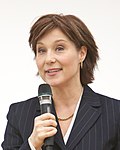Aftermath
After winning the by-election, Christy Clark remained the premier of British Columbia for the rest of the 40th parliamentary term. [5] In October 2013, Ben Stewart was appointed by Christy Clark to be the BC Special Representative in Asia. In the 2017 election, Clark won again in Kelowna West (renamed from Westside-Kelowna), but her party lost their majority, resulting in a hung parliament. Despite her effort to keep the confidence of the legislature, her government was defeated fifty-one days after the general election, following the arrangement of a confidence and supply agreement between the New Democratic and Green parties. [6] [7] After losing the premiership, Christy Clark resigned her seat as an MLA, and another by-election was organized in Kelowna West, which was eventually won by Ben Stewart. Clark also resigned her position as leader of the BC Liberals and was replaced by Andrew Wilkinson in the subsequent leadership election.
This page is based on this
Wikipedia article Text is available under the
CC BY-SA 4.0 license; additional terms may apply.
Images, videos and audio are available under their respective licenses.

